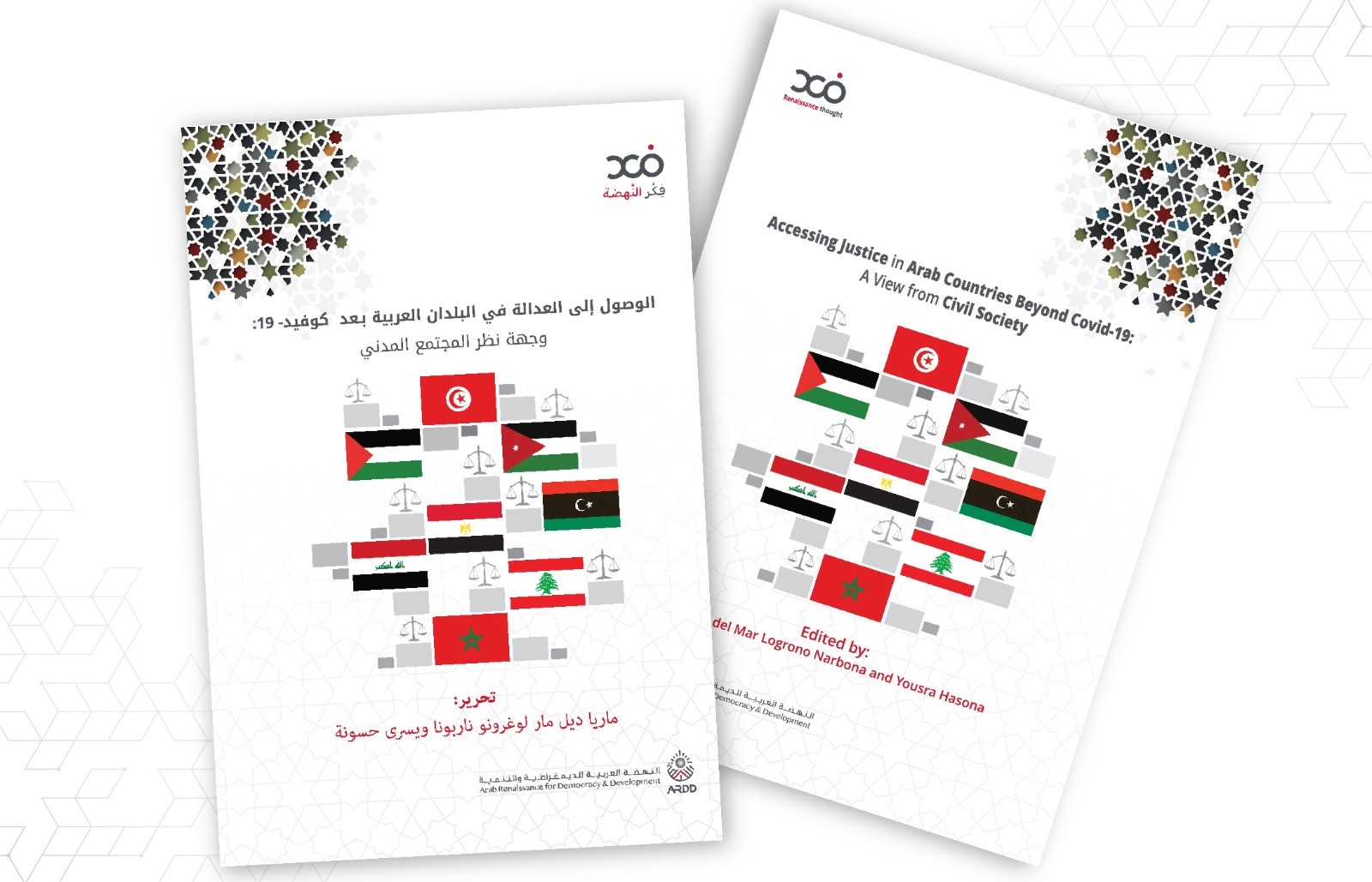“The justice sector in the Arab world and in Jordan has gone through several changes, starting with the Arab Spring, then the Covid-19 pandemic, all the way to the geopolitical transformations in the region, which calls for focusing on the current needs of individuals, ensuring their access to justice and services, and building their confidence in the law and its sovereignty, especially since this sector intersects with all societal issues.”
With these remarks, experts from the Arab region agreed on the importance of the justice sector and its impact on society as a whole, including citizens, refugees, and migrants, during the digital seminar held by the Arab Renaissance for Democracy and Development (ARDD), Tuesday, June 11, 2024, to launch the book titled: “The Status/Future of the Justice Sector in the Arab Region beyond Covid-19: A Rights-Based Approach“, which was presented by the senior advisor on inclusive Social Protection and Access to Justice Programs at ARDD’s Renaissance Strategic Center, Dr. Maria. del Mar Logroño, and moderated by researcher Yousra Hasona.
According to Logroño, the volume explores governance and judicial independence in Arab countries, which often operate in suboptimal conditions. Some countries lack judicial independence entirely, while in others, it is weak. Moreover, the volume explores legal frameworks in Arab countries as a complex mix of religious, Western colonial, and post-colonial legacies, creating unresolved legal tensions and unmet legal needs.
In her presentation, Logroño explained that the volume is the product of a conversation over a six-month period among practitioners and experts in the field of access to justice in Egypt, Iraq, Jordan, Lebanon, Libya, Morocco, Palestine, and Tunisia, with support and funding from the French embassy, and it seeks to provide an analytical view of the status of the justice sector and the right to access justice by exploring three main dimensions of analysis: governance of the justice sector, supply of justice services, and demand for justice.
Regarding the Jordanian context, Logrono said: “Despite the challenges, there is an opportunity to improve and move towards a more equitable justice system, focusing on inclusive justice services that meet the needs of all individuals, and this involves strengthening institutional capacities and ensuring access to services for all. Women, children, and refugees are particularly vulnerable to lack of access to justice.”
In Tunisia, Professor of Public Law at the Faculty of Law and Science, Dr. Hafidha Chekir, said that the justice sector is a symbol of the rule of law and a precondition for the protection of individuals and ensuring their rights, pointing out that the pandemic has had an impact on the functioning of the sector in general.
In Libya, Dr. Abdel Moneim Al-Horr of the Institute of Arab Studies pointed out that illegal migrants face problems when seeking health care, explaining that there are reasons that led to the deterioration of the situation of justice in the country, especially during the Covid-19 period, including the issue of the proliferation of weapons among citizens, political divisions between governments, the economic and financial challenge and inflation that hit the country, among other problems.
In Egypt, President of the Egyptian Foundation for Refugee Rights, Ahmad Badawi, noted that Egypt has been affected by several political phases and challenges, which affected the functioning of the justice sector, which was demonstrated by the slow litigation processes and the shortage of judges. These crises were exacerbated during the Covid-19 pandemic, especially in the process of filing lawsuits and following up on litigation procedures, the closing of courts, and the problem of the implementation of court orders, specifically in the issue of judicial follow-up on women’s alimony.
Regarding the context of the justice sector development in Palestine, lawyer Ashraf Abu Haya said that the Palestinian context is always different, especially since it is under occupation, as the sector suffers from infrastructure problems and scarcity of financial resources, and is affected by discriminatory laws enacted by the occupation, as well as the difficulty of women’s access to justice.
Regarding the situation of justice in Lebanon, the director and founder of Justice Without Frontiers in Lebanon, Brigitte Chelebian, confirmed that there are four protective laws for individuals, but there is no real activation of them. During the pandemic, the country was affected by economic and political challenges and the depreciation of currency, stressing in this aspect the important role of civil society in amending laws and taking protective measures.
With reference to the contexts of the justice sector in Morocco and Iraq, which were explained in the book by the Director of the Iraqi Institution for Development, Iyad Saleh, and the Moroccan lawyer Abderrahim Jamaï, and despite the differences between the two contexts, the common features in terms of infrastructure, human resources, and competencies required are somewhat similar, which requires a quick response from decision-makers to end the vulnerability of this sector to the surrounding conditions and ensure its safety, efficiency, and independence.
In conclusion, as we launch this book, which is available at ARDD, we extend our thanks and gratitude to all the experts who contributed to this strenuous effort, and who stressed that each crisis represents an opportunity to improve and develop justice systems by continuing the participatory work and moving forward among the countries of the region to reform and develop the justice sector to be more just and equitable, as the book carries with it many recommendations in this regard. The experts also stressed the importance of providing integrated services to all women, children, the elderly, and people with disabilities, combining legal and psychosocial support, as well as paying attention to the issue of digitizing the sector and its continuous development, and the need for continuous development and training of workers in the sector.



